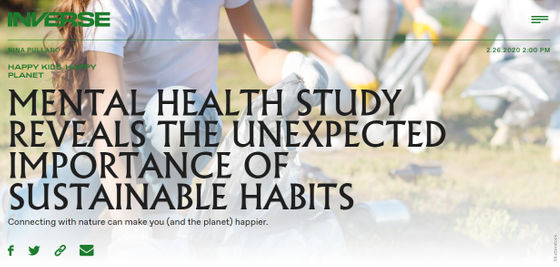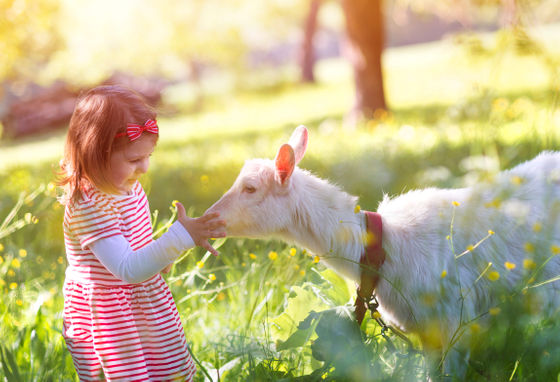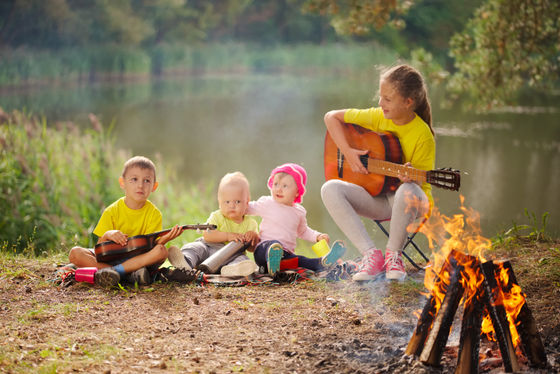Children who can feel connection with nature turned out to be `` not only happy themselves but also friendly to others ''

Previous studies have shown that '
Frontiers | Connectedness to Nature: Its Impact on Sustainable Behaviors and Happiness in Children | Psychology
https://www.frontiersin.org/articles/10.3389/fpsyg.2020.00276/full
Mental health study reveals the unexpected importance of sustainable habits
https://www.inverse.com/science/mental-health-study-reveals-unexpected-importance-of-sustainable-habits

Nature makes children happier, science shows-CNN
'While humanity is facing a variety of environmental issues, considering that the future of the earth belongs to children, it is important to see if children can build a sustainable society. There is not much research on the relationship between the connection of children and the behavior of children, '' says a study by Laura Fernanda Valera Hernandez and others who are studying psychology at the Sonora Institute of Technology in Mexico. Team.
To this end, Valera Hernandez and his colleagues conducted a total of three surveys of 296 children aged 9 to 12 living in Mexico. The first survey examines children's 'connection with nature.'
Children like to listen to various sounds of nature, feel comfortable in nature, humans are part of the natural world, enjoy collecting stones and shells, and take care of animals I received a Likert-scale questionnaire that answers 16 questions, such as `` I like it '' and `` I'm sad to see the wild animals hurt '' in five steps from `` completely applicable '' to `` not at all applicable '' Was.
The second survey on 'sustainable social behavior' responded to 'altruistic tendencies, environmentally friendly behavior, fairness and moderation.' For example, a questionnaire surveying altruistic tendencies included items such as 'giving used clothes to people,' 'funding for the Red Cross,' and 'helping fallen people.' Environmentally-friendly activities include 'separate used PET bottles', 'recycle actively, recommend recycling to friends and family', 'turn off lights in unoccupied rooms', 'brush your teeth' For example, 'stop water while you are there' and 'shorten the time to open the refrigerator as much as possible'.
Finally, the research team conducted a comprehensive survey of the three findings by conducting a questionnaire to determine the child's 'happiness' using the subjective happiness scale (SHS) .

As a result, they found that there was a correlation between 'connection with nature', 'sustainable social behavior', and 'happiness'. In particular, the connection with nature was most closely related to 'happiness', and 'alternative tendencies' and 'environmentally friendly behavior' in 'sustainable social behavior' in 'sustainable social behavior' Followed.
The research team says, 'Children who feel a strong connection to nature tend to take action to build a more sustainable society. It has also been suggested that the more altruistic, frugal and impartial children have a greater sense of happiness. '
While it has been found that contact with nature is important for children, the negative consequences of less contact with nature are also becoming apparent. For example, at schools, before this kind of research was conducted, various problem behaviors were observed in children who spent less time outdoors, and these symptoms were called ``
Mark Niewenhausen, a researcher on the relationship between environment and health at the Barcelona International Health Institute, told a news site Inverse, 'Nature is needed for child development because human beings live in the savannah and jungle for a long time. I believe that humans have only lived in cities for hundreds of years, and the brain has not been able to adapt to this change. And stress on the development of the brain, especially for young children. '
Niewenhausen's idea is based on the biophilia hypothesis that 'humans are naturally born to seek connections with nature and other creatures.' Niewenhausen has previously shown in a study of 3,585 people in four European cities that `` between low exposure to nature during childhood and nervousness and depression from adulthood. the fact that there is a correlation 'is to locate and you.

As the importance of interacting with nature becomes apparent to children, there is a growing movement to actually focus on interacting with nature. 'Children need a model for lifelong learners who are thrilled, have fun and interact with nature,' said Miyuki Maruping, who teaches children horticulture at the Waldorf School, an educational organization in Atlanta, USA. You don't have to be an environmental science or nature expert; it's important to spend time with your children in a fun and safe environment to satisfy their curiosity. '
Waldorf School, which has schools outside Atlanta, runs a nature education program called ' Kindergarten in the Forest ' in various parts of the United States, and says that children are doing outdoor activities such as gardening and hiking.
'This study is a lesson for educators. Parents and teachers with children should have more opportunities for children to experience nature. This will help them grow into happy and green adults. '
Related Posts:
in Science, Posted by log1l_ks







